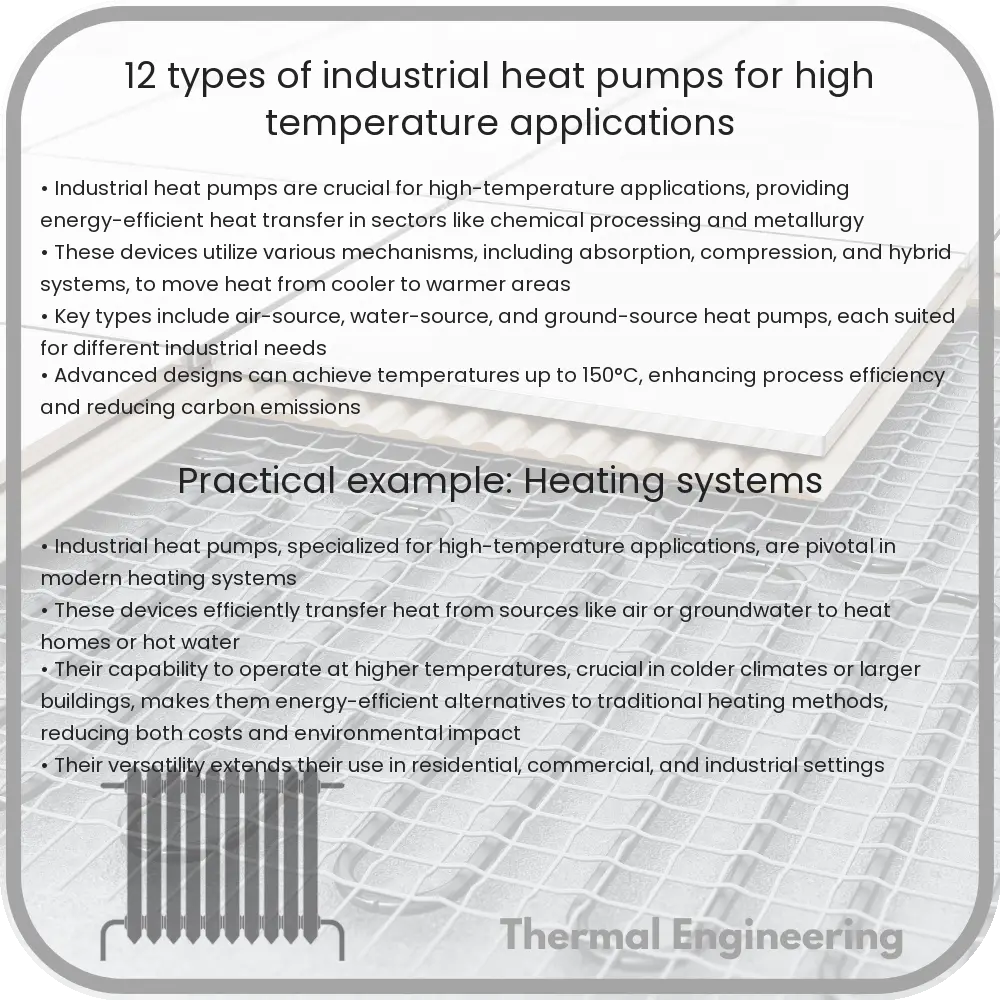Explore 12 types of industrial heat pumps designed for high-temperature applications in various industries.

12 Types of Industrial Heat Pumps for High-Temperature Applications
Industrial heat pumps are key components in various industrial processes, particularly where high temperatures are required. They are designed to transfer heat from a source to a destination, often increasing the temperature using mechanical work or natural heat flows. This article explores 12 different types of industrial heat pumps used for high-temperature applications, which typically involve operations exceeding 70°C. These heat pumps are essential in sectors like chemical processing, food and beverage manufacturing, and paper production.
Types of High-Temperature Industrial Heat Pumps
- Compression Heat Pumps: These pumps use mechanical energy to compress a refrigerant, which then heats up as it is compressed. Variants include air-source, water-source, and ground-source compression heat pumps.
- Absorption Heat Pumps: Utilizing a heat source, such as natural gas or solar energy, these pumps rely on an absorption cycle involving a refrigerant and an absorbent fluid, commonly used where waste heat recovery is viable.
- Exhaust Air Heat Pumps: Specifically designed to recover heat from exhaust gases in industrial settings, these pumps are effective in reducing energy consumption and environmental impact.
- Steam Compression Heat Pumps: These pumps elevate the pressure and temperature of steam, making it suitable for processes like sterilization or heavy cleaning.
- Gas Compression Heat Pumps: Similar to steam compression, these devices compress gases other than steam, adapting the temperature and pressure to specific industrial needs.
- High-Temperature Heat Pumps: Capable of reaching temperatures up to 150°C, these are used in processes requiring significant heat, such as drying and curing operations.
- Cogeneration Heat Pumps: These systems combine heat and power generation, utilizing the waste heat from electricity production to enhance overall efficiency.
- Chemical Heat Pumps: These use chemical reactions to absorb or release heat, providing energy savings and environmental benefits.
- Desiccant Heat Pumps: Ideal for operations requiring humidity control, these pumps combine moisture absorption properties with heat pumping.
- Solar-Assisted Heat Pumps: Incorporating solar energy to reduce electricity usage, these systems are both sustainable and cost-effective for daytime industrial operations.
- Geothermal Heat Pumps: Using the stable temperatures of the ground or water sources, geothermal pumps are highly efficient for both heating and cooling purposes.
- Hybrid Heat Pumps: Integrating features of different heat pump types to optimize performance and efficiency according to specific application requirements.
Conclusion
Heat pumps play a critical role in industrial applications, especially those involving high temperatures. Each type of heat pump provides distinct advantages, depending on the specific industrial context and the desired outcome. By understanding the various options and their applications, industries can make informed decisions that promote efficiency, sustainability, and cost-effectiveness.
Selecting the appropriate heat pump type is crucial for maximizing energy recovery, reducing operating costs, and minimizing environmental impact. As technology advances, the potential for even more efficient and adaptable heat pumps continues to grow, broadening their applicability across diverse industrial scenarios.
Further Reading
For more detailed information on each type of heat pump and specific case studies demonstrating their use in industry, readers are encouraged to explore additional resources in engineering databases and professional journals. Understanding specific operational parameters and maintenance requirements is key for optimal selection and operation of industrial heat pumps.